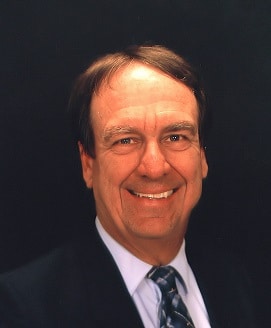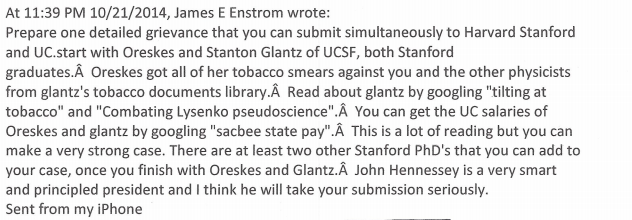This article was co-written by Dan Zegart, author of Civil Warriors, the legal siege on the tobacco industry.
A leaked email chain reported earlier this week on DeSmog shines a harsh light on the behind-the-scenes coordination between well-known climate deniers and fossil fuel funded spindoctors.
But it turns out that there is much more to this story than just climate change, and we find ourselves once again reaching back into the rich history of scientists paid by tobacco companies to conduct research bringing into question the links between cigarette smoke and cancer.
The October 2014 email discussion, led by infamous climate denier Fred Singer, asks whether it would make sense to file a lawsuit to try and stop the release of the new feature length documentary, Merchants of Doubt – a film tracing the tactics used by Big Tobacco to spread misinformation and how those same tactics are now being used by those attacking climate change science and the 97% consensus.
As an expert-for-hire who has taken money from both Big Tobacco and fossil fuel companies over the span of his career, S. Fred Singer is a major focal point in Merchants of Doubt.
But where the really interesting story lies, is in two of the recipients of the Singer email who share an uncannily similar history.
One recipient is Willie Soon, a name familiar to loyal DeSmog readers who have no doubt seen stories on the Willie Soon Harvard-Smithsonian scandal over the past few weeks. Dr. Soon, has been making headlines for his funding from utility (coal) and oil companies, in exchange for publishing peer reviewed scientific papers that question the role of carbon dioxide pollution in warming the planet.
Another recipient on the Singer email chain, James Enstrom, advised Singer to launch grievances with Stanford, Harvard and University of California against Naomi Oreskes and Stanton Glantz — an intimidating ‘attack the messenger’ tactic we’ll revisit in a moment.
Enstrom is a former University of California Los Angeles epidemiologist who has been making headlines as of late after UCLA settled a wrongful termination suit that Enstrom had filed. Some right-wing blogs have portrayed Enstrom as a hero for winning the suit last month, in which he claims he was let go by UCLA in an attempt to “purge an academic dissenter.”
At the crux of the suit was Enstrom’s research concluding that there is no causal link between diesel soot and deaths in California — a conclusion that runs contrary to the California Air Resources Board’s claim that new fuel standards on diesel emissions in that State will save close to 10,000 lives over the next 14 years and save billions in health care costs.
Enstrom says it was his contrarian view that resulted in UCLA not renewing his contract.
In the recently exposed Singer emails, Enstrom suggests that instead of suing those behind the Merchants of Doubt film, that Singer instead go on the attack and lodge complaints to Harvard and Stanford against Dr. Naomi Oreskes, the professor whose book with Erik Conway of the same name serves as a foundation for the film.
Enstrom writes:
Enstrom elaborates on how this attack could unfold:
Apparently the academic freedoms Enstrom appears to hold so dear in his wrongful dismissal suit, do not extend past himself.
But it is not the UCLA lawsuit, or Enstrom’s name alongside Soon’s on the Singer email string, where the similarities lie between Enstrom and Soon.
It is instead the willingness of both men to take large sums of money from industry-related interests and then to produce science that suits those interests’ needs.
While Soon was recently exposed for taking money from fossil fuel interests and failing to disclose it to Congress or science journals, while Enstrom has been taking large sums of money from tobacco companies over the years and often not disclosing it.
For almost thirty years, Enstrom’s research into smoking and health was funded by the cigarette makers.
In fact, Enstrom did so much work for Big Tobacco that when the United States Department of Justice summed up its civil RICO case against the cigarette makers [PDF] at the end of a months-long trial in a lengthy legal filing, Enstrom got his own chapter — one of just three scientists singled out by DOJ out of many dozens of tobacco-funded researchers for having been vital to the industry’s efforts to sow confusion about the health effects of smoking.
U.S. District Court Judge Gladys Kessler apparently agreed on Enstrom’s role, singling out his work for extensive treatment in a scathing 1652-page final opinion in 2006 [PDF] in which she ruled that the tobacco companies were indeed a “racketeer influenced and corrupt organization” under the RICO law, a decision upheld by the Supreme Court.
In a section entitled “Defendants and Their Paid Consultants Controlled ETS Research Findings,” Kessler zeroed in on a 2003 study published in the British Medical Journal by Enstrom and co-author Geoffrey Kabat claiming that links between secondhand smoke, or environmental tobacco smoke (ETS) and lung cancer or coronary heart disease “may be considerably weaker than generally believed.”
The study was “funded and managed” by the Center for Indoor Air Research, a scientific front group set up to cast doubt on the link between ETS and disease, to the tune of $525,000 in 1998, after Enstrom did a “pre-cursor” study for $150,000 in 1997 — a year in which he was already being paid by another tobacco front called the Council for Tobacco Research.
Kessler wrote that Enstrom chose to examine data that was the least likely to show an association between ETS and disease, despite being “repeatedly warned” by the American Cancer Society that using the data,
“in the manner he was using it would lead to unreliable results. Enstrom used only a small subset of the overall data, and, more importantly, the data corresponded to participants who enrolled in 1959, a time when exposure to tobacco smoke was common.”
Kessler noted that the Center for Indoor Air Research funded two types of research proposals. One set were pre-screened by the CIAR‘s Scientific Advisory Board, made up of scientists from outside the industry.
But Enstrom’s study was funded as an “Applied Project.” Applied Projects by-passed the SAB and were chosen directly by the CIAR‘s Board of Directors, made up of in-house tobacco scientists, executives and a high-ranking industry lawyer.
In fact, legal considerations — and lawyers — were at the very heart of the decision-making process at CIAR.
Wrote Don Hoel, an attorney with Shook Hardy and Bacon (SHB), which represented tobacco company Philip Morris (PM):
“Within that organization [CIAR], SHB represents the interests of PM in evaluating research proposals and in determining which existing projects should be continued.”
Enstrom’s contracts specified that among the “deliverables” his research was expected to produce was publication in a peer-reviewed scientific journal.
With the source of his funding kept confidential, Enstrom became a high profile authority in articles in the mainstream press which cited him as an independent scientist who was convinced that the evidence linking ETS to disease was weak.
Back to present day.
While as far as we know Soon has no ties to big tobacco, nor has he done any work that brings into question the links between cancer and tobacco smoke, the similarities in the stories of Soon and Enstrom, and the trajectories of their careers, are uncanny.
Two scientists found to have been paid large sums of money by companies that benefit from their conclusions.
For Enstrom, his research bringing into question the links between tobacco smoke and cancer, with his Big Tobacco sponsors hoping the effect will be to slow proposed regulations limiting exposure to tobacco smoke in public places.
For Soon, his research downplaying the role fossil fuels play in climate change, with his Big Oil and Coal sponsors hoping the effect will be to slow down government regulations that would curtail carbon emissions from dirty fossil fuels.
Some might say this has all the makings of a grand conspiracy theory. But when something is documented this well and the links are made based on solid evidence there is very little theory left to prove.
And while this story is about two of the main characters, there is a larger question about where the corporations fit in.
In the case of the tobacco companies, that question has already been answered in the form of a massive class action lawsuit by 50 US State Attorneys General that was settled for a whopping $206 billion.
In the case of the fossil fuel companies paying the likes of Soon to deliver science that suits their needs, that story has yet to reach its final chapter.
Subscribe to our newsletter
Stay up to date with DeSmog news and alerts








